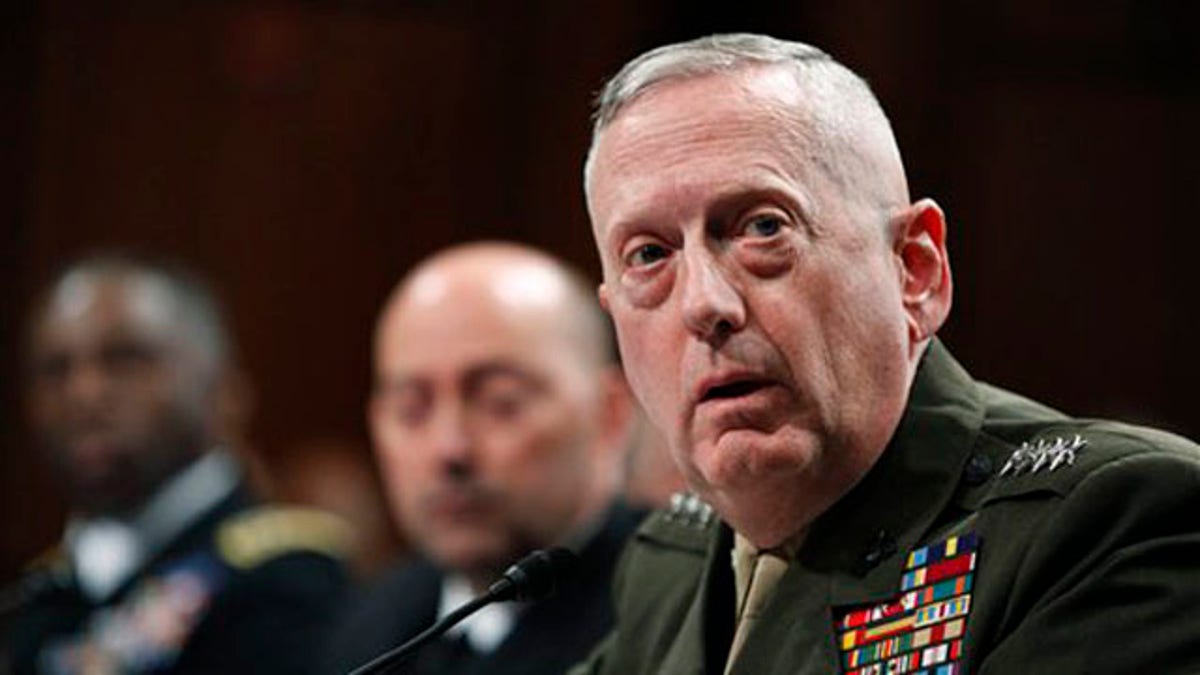
In this March 9 file photo, Gen. James N. Mattis testifies on Capitol Hill in Washington. (AP Photo)
After issuing a new policy enforcing more discipline over military interaction with the media, Defense Secretary Robert Gates on Thursday named to lead U.S. Central Command a general who in 2005 was rebuked for saying "it's fun to shoot some people."
Gates recommended Marine Corps Gen. James Mattis for the job left by Gen. David Petraeus, who assumed command in Afghanistan over the weekend. Petraeus was transferred after Gen. Stanley McChrystal was forced to resign following the publication of a magazine article in which he and his aides were critical of civilian officials.
After the incident, Gates issued an updated media policy reining in interaction with the press. But as he defended that decision against a skeptical press corps on Thursday, the Pentagon chief dismissed concerns that his new pick for Central Command once had media problems of his own.
"That was five years ago," Gates said. "I think that the subsequent five years have demonstrated that the lesson was learned. ... I have every confidence that General Mattis will respond to questions and speak publicly about the matters for which he is responsible in an entirely appropriate way."
Mattis made the controversial comments in February 2005 at a San Diego forum. An audio recording showed him saying: "Actually, it's a lot of fun to fight. You know, it's a hell of a hoot. ... It's fun to shoot some people."
He directed that sentiment toward "guys" in Afghanistan "who slap women around for five years because they didn't wear a veil."
"You know, guys like that ain't got no manhood left anyway. So it's a hell of a lot of fun to shoot them," he said. The commandant of the Marine Corps at the time "counseled" Mattis over his remarks and released a statement saying he should have chosen them "more carefully."
Mattis, a seasoned war veteran, is best known for leading troops into the bloody battle of Fallujah in Iraq in 2004.
As Gates announced Mattis as his choice, he also explained in more detail the media policy for the U.S. military.
He said he does not want to "impinge" or "impede" the flow of information to the press. "This is not my intent, nor will I tolerate it," Gates said.
He said he concluded several weeks ago, following a series of incidents spanning two administrations in which senior defense officials got into trouble over comments in the press, that the military needs "greater coordination and discipline."
Gates said he does not view the media as the enemy. "This is not about you. This is about us," he said.
The media policy memo says the Defense Department has "grown lax in how we engage with the media." It demands that the Pentagon's public affairs unit be notified "prior to any interviews or any other means of media and public engagement with possible national or international implications."
Reporters argued with defense officials in an on-the-record gaggle on Wednesday morning that almost every story they write has "national or international implications" and questioned just how far the Pentagon plans to take this rule. At the very least, Pentagon reporters said they fear that already-reluctant military officers or commanders will be less likely to speak to the press, and that it could send a "chilling effect" across the military leadership at a time when the country is engaged in two wars.
Pentagon spokesman Geoff Morrell said it's the responsibility of his office to review interview requests for any "potential mine fields" ahead of time. "Just to return a phone call... even if it's just a background interview?" one reporter asked. "Absolutely... if it is of national or international significance we would need to have visibility on that," Morrell said.
Pentagon Spokesman Col. Dave Lapan said the memo is just reinforcing old rules and that the Pentagon will be able to handle the increased flow of requests. "It is making what is ad hoc today more solidified in practice and in policy," Lapan said.
Defense officials say the Pentagon memo was in the works as early as this spring and did not result from McChrystal's resignation. In a press conference two weeks ago, Gates said of the McChrystal incident, "I think that to let it impact the relationship I have with the press would be a mistake."
Fox News' Justin Fishel and The Associated Press contributed to this report.












































